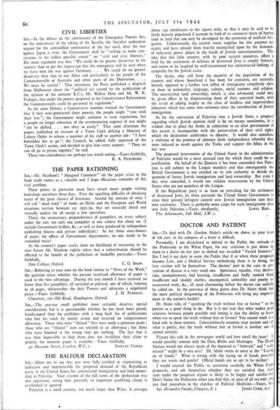CIVIL LIBERTIES
Sta,—In the debate on the continuance of the Emergency Powers Act, on the anniversary of the taking of the Bastille, the Socialist spokesman argued for the unmodified continuance of the Act until, after the war against Japan is over, the Government shall be " willing to make con- cessions to the fullest possible extent " on " civil and civic liberties." His main argument was that " We could do no greater disservice to the country than to get the impression that the emergency will be over when we have won the war against Germany. . . . We could do no greater disservice than that to our Allies and particularly to the people of the Commonwealth of Australia and other parts of the Dominions. . . . We must be careful." That afternoon, the Press published a dispatch from Melbourne about the " political stir caused by the publication of the opinion of the eminent K.C.s, Mr. Wilbur Ham and Mr. W. K. Fullagar, that under the powers proposed in the Constitutional Referendum the Commonwealth could be governed by regulation."
In the same Debate, a Conservative member warned the Government that if they over-protracted these powers, the people might " vote with their feet "; the Government might continue to issue regulations, but a people no longer conscious of the overmastering urgency of war might " not be shifted, . . . not obey so easily." That same afternoon the papers published an account of a Town Clerk defying a Ministry of Labour Order to release a member of his staff to another job: " I have forbidden her to go "; the Council, he added, fully approved of the Town Clerk's action, and decided to give him every support. " Then we can all go to prison together," he said.
These two coincidences are perhaps just worth noting.—Yours faithfully, K. A. PICKTHORN.






















 Previous page
Previous page